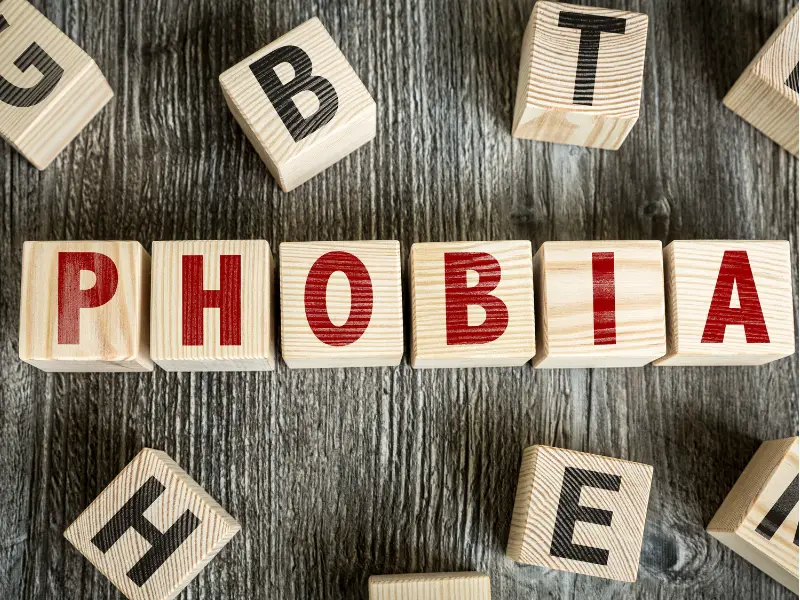Unfortunately, not everyone thinks of rabbits as cute, fluffy animals – whether they live in the wild or as a rabbit owner’s fur baby. Some people have a rabbit phobia.
But is a fear of rabbits real? And can you get over your fear?
An irrational and excessive fear (phobia) of rabbits is called leporiphobia. People can be scared of rabbits for various reasons: a traumatic experience involving rabbits, the perception that these animals look unsettling, or thinking rabbits are scary. Leporiphobia is real but rare.
Here’s everything you ever wanted (and needed to know) about the bunny phobia, also called leporiphobia.
Is a Phobia of Rabbits a Real Thing?
A phobia or extreme fear of rabbits is real. It’s rare, but some people are genuinely scared of bunnies.
According to a 2007 study on “Understanding Animal Fears: A Comparison of the Cognitive Vulnerability and Harm-Looming Models” that was published in BMC Psychiatry, it was found that there are a few reasons why people are scared of animals, including rabbits.
People fear animals because they perceive the animal to be uncontrollable, disgusting, or dangerous. In general, more people are scared of rats, sharks, snakes, and spiders than cats, rabbits, or moths.
Rabbits, together with ducks, cats, fish, guinea pigs, and squirrels, are among the six least feared animals. So yes, a rabbit phobia is real but it isn’t common.
It’s more likely to find someone who is scared of animals that are generally viewed as more dangerous and/or disgusting than someone who is afraid of bunnies.
What Is Lepidopterophobia vs Leporiphobia?
A person has Lepidopterophobia (pronounced as lep-ah-dop-ter-a-pho-bee-ah) when they are scared of moths and butterflies.
On the other hand, leporiphobia (pronounced as lep-ah-ree-pho-bee-ah) is an irrational and excessive fear of rabbits.
A person may develop leporiphobia after a rabbit attacks them. However, it’s rare for a rabbit to viciously attack a person because rabbits are prey animals. Wild rabbits will rather run the other way when they get wind that a human is near.
Pet rabbits can act out, especially if they aren’t spayed or neutered. Bunnies can be very territorial, and a kick or bite when the bun’s handled incorrectly can be quite traumatizing, especially for a young child.
So most often, people who fear rabbits think that rabbits look unsettling in their appearance, or they are scared a rabbit will attack them – either because of a negative past experience or an irrational fear.
You can also develop a rabbit phobia if a parent, friend, or close family member had leporiphobia.
Interestingly, people can also fear Easter. This phobia is called Paschaphobia, and it can be triggered because of a fear of rabbits (most specifically, the Easter Bunny) or a fear of holiness (zeusophobia).
Signs and Symptoms of Leporiphobia

The symptoms and signs of Leporiphobia aren’t necessarily the same from person to person. In fact, as with any phobia, the biggest symptom of the phobia is an out-of-proportion fear of rabbits.
The person with rabbit phobia may be irrationally scared of coming into contact with rabbits.
Other symptoms of leporiphobia include:
- Panic attacks or severe anxiety when thinking about or seeing rabbits
- Avoidance techniques like not visiting pet stores where you might run into these animals
- Sleep problems like insomnia
- Debilitating fear of rabbits that affects how well you function in your daily life
- Feeling like you need to escape
If a person has a phobia, they’ll exhibit phobia symptoms for six months or longer.
And before being diagnosed with leporiphobia, other anxiety disorders, post-traumatic stress disorder (PTSD), and obsessive-compulsive disorder (OCD) need to be ruled out as causes for the phobia symptoms.
How Can I Stop Being Scared of Rabbits?
There is no one-size-fits-all method to stop being scared of rabbits. You need to find what works for you, but you will need to face your fear of rabbits to improve how you function every day.
It’s essential to find a support system to help you feel understood and not judged for your fear of rabbits.
Consider the online support group of the Anxiety and Depression Association of America, the help page on Mental Health America, and Psychology Today’s Find the Best Therapy and Support Groups Near You page.
You can also research and implement coping techniques like:
- Regularly exercising
- Reducing stimulant intake (like coffee)
- Relaxation techniques (like breathing exercises, being mindful, and practicing meditation)
Other methods of overcoming your phobia of rabbits include:
- Cognitive behavioral therapy (CBT)
- Exposure therapy
- Medication
- Hypnosis
- Virtual therapy
If your child has leporiphobia, they may cry, throw tantrums, cling to you, or freeze up when faced with a rabbit – in real life or on digital media. Here’s how you can help your child who fears bunnies:
- Talk with your child about their fear and anxieties and work through the phobia with them.
- Don’t judge or be mean to them. Understand, have empathy, and create a safe space where they can share and feel loved.
- Support your child and reassure them when needed.
- Don’t force them to be brave. It’ll take time for them to overcome their rabbit fear.
- Take them for counseling or visit a child psychologist if you need assistance helping your child.
When Do You Need to Seek Medical Help?
If you are suffering from leporiphobia (or any other phobia), you need to seek medical help when the phobia is preventing you from living your life to the fullest.
Most people may think they can cope if they are scared of rabbits, but if your partner has a rabbit or your child has a bunny phobia, it’s best to get help so the phobia can be treated.
My Last Bunny Thoughts
Having a phobia is no laughing matter, even if that phobia is a fear of rabbits. Sure, most people see rabbits as cute, furry animals and would love to have one as a pet or emotional support animal.
Other people are actually scared when confronted with thoughts or real-life interactions with a rabbit. There are ways to get help and overcome leporiphobia.
You just need to put in the work and find out what’s the best way to overcome your phobia. Good luck!
Related Articles:

